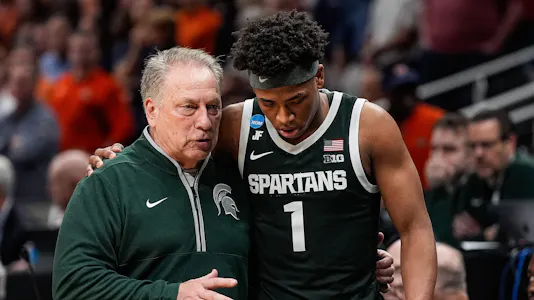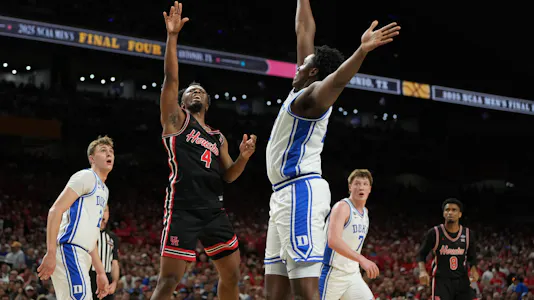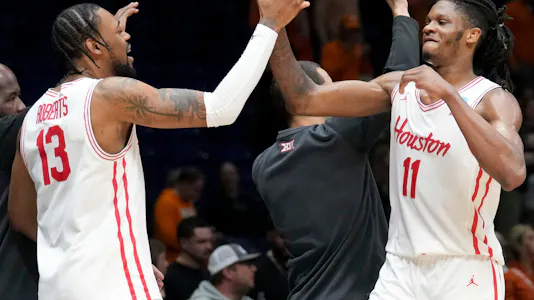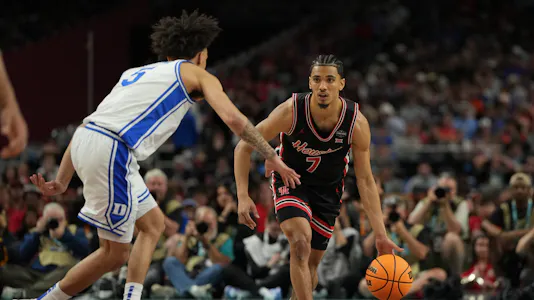How to Win Your March Madness Work Bracket: Using Game Theory for the NCAA Tournament

Last Updated: March 20, 2025 9:33 AM EDT • 15 minute read X Social Google News Link

Winning a March Madness pool can seem like an impossible task, especially in a large group competition, with how random the NCAA Tournament can seem at times. It becomes even more difficult when you realize that the best March Madness work bracket shouldn't necessarily just back the biggest March Madness odds favorites - since that's what many of your co-workers will be doing with their March Madness bracket.
So what's the best way to approach a large bracket pool at work? Incorporating a strategy like game theory could give you the edge you're looking for to win your work bracket ahead of the 2025 NCAA Tournament, which gets underway today.
👉 Want AI-driven bracket insights? Check out our full March Madness AI bracket predictions with score predictions for every game.
🏆 How to use game theory to win your March Madness bracket pool

🤔 What is game theory?
Game theory can sound vague or complicated, but it's actually quite straightforward. It's a strategy used to help maximize your success in a competition or environment that has multiple players or competitors involved. Using game theory can help you analyze situations and decision-making to give you an edge based on what other competitors may do. Put simply: you make your choices based on their choices.
🎮 Why is game theory an important strategy?
Game theory can be an important strategy to help separate you from the competition, and it can apply to everything from March Madness brackets to politics to role-playing games. It can help you make the best decisions by anticipating what others might do while helping you find the best course of action to lead you to success. Game theory can be a framework that helps give a strategic edge in any competitive environment.
🏀 Why should game theory be applied to March Madness work brackets?
March Madness work brackets typically include a large number of competitors, so to win the entire pool, you need to consider how others will make their picks. If you back all the top seeds, it's more likely than not that others are doing the same, especially when there are varying degrees of college basketball knowledge from those involved.
To give yourself an edge in a larger March Madness pool, you'll need to apply game theory by making your picks strategically. This helps maximize expected value and is a more effective strategy than just picking teams that you think are most likely to win.

📊 How game theory gives you an edge for NCAA Tournament

💡 Understanding your competition
Not everyone is a college basketball expert - heck, most people fill out their bracket without having watched a single team prior to March Madness. That's why game theory can be a massive help when putting together a bracket in a large work pool.
Think about it this way: if you didn't know anything about any of the teams hitting the hardwood in the NCAA Tournament, you would naturally lean on the highest seeds to make the most noise. So if you're trying to beat the competition, you won't do so by following the same strategy.
Something else to consider is that many bracket competitors will recognize brand-name or "blue blood" programs like No. 7 seed Kansas or No. 3 seed Kentucky, which will naturally lead them to back those programs to make major noise in the tournament even in down years for those teams. Meanwhile, a team like No. 2 seed St. John's - which hasn't been nationally relevant since the Lou Carnesecca days - has proven to be far more consistent this season than the Jayhawks or Wildcats.
So it pays to be contrarian to some degree and not rely too heavily on safe picks or big programs. That becomes even more important the larger your March Madness pool is, which is where game theory can really set your bracket apart.
📏 How should the size of your bracket pool impact your strategy?
Game theory is a great strategy in large pools, but it's less effective in smaller ones. Think about it: if you only have two people in a pool, you don't have to worry as much about the other person's picks. If it's a pool of 2 million, then you'll be hard-pressed to win it all with chalk picks.
So consider the size of your March Madness pool before applying game theory to your bracket. If your pool is no more than 50 people, than it's probably more effective to just make your picks based on matchups. However, if your pool includes more than 100 competitors, game theory is a great way to differentiate your bracket. Bigger pools mean higher-risk picks can lead to a higher-reward outcome and separate yourself from the crowd.
💵 What is expected value?
Expected value is a concept within game theory that looks at the average outcome you can expect based on your decision-making. It considers the different outcomes and their probabilities to help you make the best choice based on a combination of likelihood and profit.
For example, if a No. 1 seed like Auburn or Duke is the best team on paper, most people in a large pool are likely to pick them to win it all. Well, if 75% of the pool has Auburn or Duke, you're more likely to be splitting the payout with more people if they win - or getting jumped by the other 25% if they don't.
Using expected value, you can try to identify a program that has reasonable March Madness odds but is less popular than those No. 1 seeds. This year, No. 1 seed Houston is a good example. The Cougars are the obvious third-best team in the country, but they might only have 5% of the pool taking them to win it, despite the March Madness odds giving them a 10.53% implied probability of taking home the title.
😈 Is contrarian strategy a good approach?
Contrarian strategy can be a key component to game theory, but it can also be a tricky one given the risk vs. reward you'll naturally run into. Mixing in contrarian strategy is a strong approach in a large March Madness pool, however, you can doom yourself if you go overboard with it.
On one hand, you may have the most unique bracket, setting you up to be the sole winner. On the other hand, you might be out of the race to win the pool by the Sweet 16 if you make too many contrarian picks.
The smartest way to go about it is by focusing on early-round upsets because we see them happen every year. Some teams get overseeded or underseeded, so using metrics can help you exploit matchups where a No. 10 seed might actually be better than a No. 7 seed, but just plays in a lesser conference.
Similarly, as you make your Final Four and championship picks, it helps to target teams that have strong resumes but are less likely to be picked by others. An example of this would be picking Houston or even an SEC powerhouse like Florida, Tennessee, or Alabama while everyone else focuses on Auburn and Duke.
📚 Use resources
Don't just pick based on seeding like everyone else in your work bracket pool - use resources to help you find exploitable matchups and target under-picked teams that have strong enough resumes to win multiple games. Odds from our March Madness betting sites can help inform you on which teams are favored and by how much without seeding being a factor.
Advanced metrics from KenPom and EvanMiya can also help you identify which teams could be in position to be upset by a lower seed. And Final Four odds can give you an idea of what teams are likely the most popular picks to reach the last weekend of the NCAA Tournament.
🧠 Using game theory scenarios in March Madness bracket pools

🤐 The Prisoner's Dilemma
Most people will make the safe picks by targeting No. 1 and No. 2 seeds to go the furthest in the NCAA Tournament. They'll also likely pick a No. 1 seed to win March Madness. Therefore, if you also pick those same teams to make it the furthest, your bracket has less value. The safe picks aren't necessarily the best picks in a large pool format - if you pick a less popular team to win it all, you have the edge.
Examples:
- 50% of the pool picks Duke to win, but the March Madness odds give them a 22.22% implied probability of winning
- 5% of the pool picks Houston to win, but the March Madness odds give them a 10.53% implied probability of winning
- If Houston wins, you have a bigger edge because so few people in the pool picked the Cougars
🔄 Nash Equilibrium
This is about finding balance between a chalk bracket and making calculated upsets picks based on how your opponents will most likely pick. If everyone is picking the same teams to win it all - like Duke or Auburn, for example - then you should try to find a different team with a strong resume to back.
Examples:
- If 75% of the pool picks Auburn or Duke to win it all, then there's not a ton of value in you backing them to win the title in a large pool
- If Houston and Florida are the other No. 1 seeds, but just 10% of the pool picks them to win it, then you're getting better value in taking them
⚖️ Zero-Sum vs. Non-Zero-Sum Games
In smaller pools, the safe approach can be the best approach because there are fewer brackets to differentiate from. That makes picking solely based on who you think are the best teams a strong approach. But with large pools, having more different picks is important to make sure your bracket stands out. It's a zero-sum game with more competitors, where you need others to lose so you can win.
Examples:
- Smaller pool: Minimize risk and back the top seeds without factoring too much into what your opponents are doing
- Large pools: High risk equals higher reward with the more players in the pool
🎲 Minimax Strategy
The worst-case in a large March Madness pool is that you pick the same Final Four teams and champion as everyone else and it comes down to losing a tiebreaker. Although it can be risky to diversify too much, in a large pool it actually minimizes your risk to have at least some difference in your Final Four picks.
Examples:
- Avoid a worst-case scenario outcome of picking a high seed to go far that has a history of not pushing deep into the NCAA Tournament
- Try not to have all the No. 1 seeds reach the Final Four - the average seed of Final Four teams is 2.9 since the tournament expanded in 1985
♟️ Mixed Strategy
While upsets can feel random during March Madness, it's important not to randomly select them when filling out an NCAA Tournament bracket. Try to target teams the public may not pick to pull an upset or use advanced metrics to identify teams that have been overseeded or underseeded. The best upset picks are teams that are under-picked relative to their chance of winning, which is why odds from our best sports betting sites can be a useful tool.
Examples:
- Pick a brand-name team to lose in a down year as a No. 5 seed to a No. 12 seed because the public is more likely to back teams they know
- If a higher percentage of people are taking a No. 6 seed to win than the odds imply of them winning, taking the No. 11 seed would be a good value
- If a higher percentage of people are taking a No. 10 seed to upset a No. 7 seed than the odds imply because the No. 10 seed is a historically relevant program, that's a bad upset pick by game theory
🔮 Applying game theory to your March Madness bracket

🌍 Analyze the regions
Look at the bracket as a whole and analyze the regions because not all teams seeded the same number are equal. Some No. 2 seeds could be a lot tougher than others, giving a No. 1 seed in a certain region a slightly easier path to the Final Four.
The same goes for mid-major programs that come from one-bid leagues that will naturally be seeded somewhere between No. 11 and No. 16. Some of those programs will be underseeded, despite strong resumes, because they come from smaller conferences. That can make certain regions tougher to come out of for higher seeded programs.
🔍 Identify undervalued teams
Use resources to find teams that have been underseeded. Some teams can be far stronger than their record or seed implies due to a tough schedule leading to more losses or because they hail from a mid-major conference.
Take No. 8 seed Gonzaga, for example. The Bulldogs had some tough nonconference games that they lost early, but advanced metrics have them as a top-15 team. A lesser-known program that could be undervalued is No. 12 seed UC San Diego, which advanced metrics have rated as the best team from a one-bid league. The Tritons only recently transitioned to Division I, but they've been a power in the Big West this season.
🎟️ Consider conference tournaments
While you don't want to overrate conference tournament performances, it can help inform which teams are playing strong basketball at the right time. If a team that earns a top-three seed in March Madness faltered in its conference tournament, I wouldn't put too much stock in that. But if a team comes out of nowhere to go on a run in its conference tournament, that could be a team worth backing.
Last year, NC State wasn't going to make March Madness but managed to win the ACC Tournament out of nowhere. It ended up earning a No. 11 seed and making a Cinderella run to the Final Four. It feels like we see at least one such team make a deep run every year, so it can pay to identify that team early on.
🃏 Be strategic with diversifying your picks
Don't back only the highest-seeded teams, even though it can be tempting. Remember, the Elite Eight consistently has teams seeded all over the place - it's not always the No. 1 and No. 2 from each region, but those are often the most-picked teams in large work brackets. That gives them so little value in this context, so try to incorporate undervalued teams where it makes sense while balancing the risk vs. reward.
📜 March Madness history to consider for your NCAA Tournament bracket
👑 Top seeds win the tournament
- No. 1 seeds have won 25 of 39 NCAA Tournaments since 1985
- No. 2 and No. 3 seeds have won March Madness nine times
- No. 4 to No. 8 seeds have won five times
- No. 9 to No. 16 seeds have never won the NCAA Tournament
🚨 First round upsets will happen
- No. 9 seeds record vs. 8 seeds: 81-75
- No. 10 seeds record vs. 7 seeds: 60-95
- No. 11 seeds record vs. No. 6 seeds: 61-95
- No. 12 seeds record vs. No. 5 seeds: 55-101
- No. 13 seeds record vs. No. 4 seeds: 33-123
- No. 14 seeds record vs. No. 3 seeds: 23-133
- No. 15 seeds record vs. No. 2 seeds: 11-145
- No. 16 seeds record vs. No. 1 seeds: 2-154
👠 Back No. 10, No. 11, No. 12 seeds to be Cinderellas
- No. 8 and No. 9 seeds have a combined 24 Sweet 16s, 14 Elite Eights, and eight Final Fours
- No. 10, No. 11, and No. 12 seeds have a combined 73 Sweet 16s, 21 Elite Eights, and seven Final Fours
- No. 13, No. 14, No. 15, and No. 16 seeds have a combined 12 Sweet 16s, one Elite Eight, and zero Final Fours
🏀 March Madness expert predictions
- March Madness South Region preview
- March Madness East Region preview
- March Madness West Region preview
- March Madness Midwest Region preview
- March Madness Final Four expert picks
- March Madness upset predictions
- Ranking March Madness 12 vs. 5 seed upsets
- How to predict March Madness upsets
- What are the most common March Madness upsets?
- What are the biggest March Madness upsets of all time?
- Who are the best March Madness Cinderellas of all time?
🔮 March Madness bracket picks & tips
- We simulated every March Madness game 1,000 times
- 50 best March Madness bracket names
- March Madness bracket deadlines
- March Madness media expert picks
- Best March Madness bracket challenges
- 2025 March Madness bracket reactions
- Free printable March Madness bracket PDF
- March Madness bracket predictions
- How to fill out a March Madness bracket
- March Madness bracket advice
- March Madness bracket tips for beginners
- March Madness bracket trends
- Printable Women's March Madness bracket
💰 March Madness betting odds pages
| March Madness Odds | Wooden Award Odds | ACC Odds | Big 12 Odds | Big Ten Odds |
| Final Four Odds | March Madness MVP Odds | Big East Odds | Pac-12 Odds | SEC Odds |
🏀 Best March Madness betting sites
Looking to bet on the NCAA Tournament? Here are our best March Madness betting sites as determined by our expert team at Sportsbook Review, along with our best March Madness betting promos ahead of the NCAA Tournament.
- Caesars Promo Code: SBRBONUSDYW | Read our Caesars Review
- BetMGM Bonus Code: SBRBONUS | Read our BetMGM Review
- bet365 Bonus Code: SBRBONUS | Read our bet365 Review
- FanDuel Promo Code | Read our FanDuel Review
- DraftKings Promo Code | Read our DraftKings Review
(21+. Gambling Problem? Call 1-800-GAMBLER)
* Bonuses not applicable in Ontario.
Not intended for use in MA.
Each betting site featured on SBR has been meticulously researched and selected by our team of experts. If you sign up through our links, we may get a commission

Rob Paul X social





